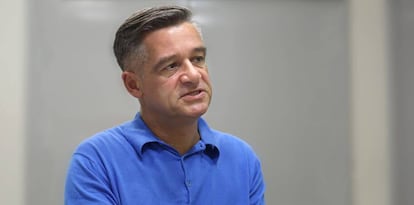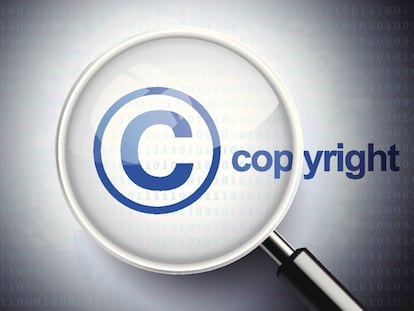Charlie Beckett: ¡°There is pressure on the media to mix fact and opinion¡±
London School of Economics expert says that the sector needs therapy to rediscover its sense of purpose

First it was Brexit. Then, the referendum in Colombia. Later came Donald Trump¡¯s victory in the United States. And more recently, the devilishly complicated outcome of the UK election, which has pushed the country into a deep state of confusion. Surveys and analysts got it all wrong. And through their reporting, the media were not able to accurately reflect the mood of the voters.
Charlie Beckett, a seasoned journalist who teaches media studies at the London School of Economics and founded Polis, the school¡¯s prestigious journalism think tank, believes that the press needs some therapy in order to rediscover its sense of purpose. The media¡¯s role is still what it always was: to offer facts, separating them from opinion. And journalists have to resist all the siren calls around them.
Question. The result of the UK election was unexpected. Many of us made the wrong forecast. Does this mean we have to change the way we cover elections?
Answer. I think we do, actually. We have become obsessed by opinion polls and forgotten that one of the things journalists are supposed to do is actually go and report for themselves. In the UK, we have a very London-centric media. I think you have to get physically out of the newsroom into different communities and report in an old-fashioned way from the ground up. Also, you have to get out digitally. There is a terrible thing happening. Journalists are all on Twitter and they are all reading each other¡¯s tweets and talking to each other and ignoring loads of other sources.
Q. It wasn¡¯t just the media who got it wrong. Politicians were not expecting this result, either.
You share articles online because you are moved emotionally or politically
A. It¡¯s true. On one hand, Theresa May ran a terrible campaign. She refused to do long interviews and TV debates. Jeremy Corbyn, at least at the start, was also very stage-managed. They kept him to very controlled places, only in left-wing areas. As the campaign developed, his advisers were very clever, getting Corbyn to do far more. Not because he himself was enormously popular, but as a way of saying ¡°we are open, we are honest, we are passionate, we develop big crowds, we have lots of people on social media.¡± That seemed to generate this idea that Labour was at least being positive and that they were the party of change.
Q. But there was very little reporting on this. It seemed like Corbyn was going to sink Labour to an all-time low.
A. There was very hostile newspaper coverage of Corbyn. I think that may have been an element that backfired. A lot of that hostile press may have actually helped to generate real passion among his supporters and they went online, on Facebook, on social media, and they shared loads of Labour propaganda. I¡¯m not saying that changed everything, but there was a dynamic there where the right-wing press was almost fueling the left-wing enthusiasm. I don¡¯t know about Spain, but generally speaking, in the UK, the campaign period doesn¡¯t usually change things. In this campaign it did change things because Theresa May was dreadful. And Corbyn, the more people saw of him, the more they thought he¡¯s not a monster.
Q.Why did you call it a fake election?
A. Because all the assumptions made both by the media and the politicians were false. The media had this false idea about what was happening, and so did politicians. The reason we had this election was because of Brexit. The prime minister told us we needed this election so she could have a majority to give her a strong and stable leadership, so she could go to Europe and negotiate. But then she didn¡¯t tell us anything about what she was going to negotiate and the same with Labour. Labour refused to talk about Brexit.
I¡¯m very worried about journalism that is funded directly by Mark Zuckerberg
Q. Many of the disruptive effects you describe have to do with technological changes in the media. These days, during elections in Spain and elsewhere, readers don¡¯t have the tools to distinguish between facts and opinion. Newspapers have always published editorials and opinion pieces. Is that hostility?
A. I think we have always had a problem with not so much fake news as complete lies. In the UK we have always had a very partisan press. They take some facts, but the different newspapers report them in a completely different way because of their political perspective. In a funny way, the British public is perhaps more used to the idea of that kind of subjective news. Added to this is the rise of a new set of left-wing websites that are very, very partisan. People read them not because they are balanced and objective, but because they agree with them emotionally.
Q. And that rise of increasingly partisan websites goes hand in hand with a rise in fake news.
A. The idea of truth is not really about whether it¡¯s factually correct. For a lot of readers, fake news is the news you don¡¯t agree with. In the past you read The Sun if you were right-wing, and you read The Guardian if you were left-wing. Now, you can go on Facebook or Twitter and you can share news according to your prejudices. You don¡¯t share an article because you think it¡¯s objective or full of good information; you share it online because you are moved emotionally or politically. In that sense, the whole public online turned into digital campaigners, which made the whole election much more volatile, and that much harder for the mainstream media to cover.
Q. How can journalists do their job in this emotional minefield?
The newspapers are finding that the more opinionated your reporting is, the more people seem to enjoy it
A. It¡¯s difficult, because the UK mainstream press certainly, and to a degree, the broadcasters, have started to mix opinion and fact. Even the BBC, when it does a report, will immediately do an analysis. And the analysis inevitably involves a kind of opinion. The newspapers are finding, in a very competitive marketplace, that the more opinionated your reporting is, the more people seem to enjoy it. So there is a kind of market pressure to do this as well. My argument would be that, yes, people like content because they agree with it. But people also like to be right. They don¡¯t like to be seen as stupid. So there is a role for a kind of journalism that says: ¡°Look, I know you believe this emotionally, but here are the facts.¡±
Q. The media are in the midst of a serious financial crisis because we still don¡¯t know how to commercially exploit digital distribution. Do you think that platforms like Google or Facebook should somehow back journalism financially?
A. The best journalists are very good. They are producing information that is exciting, interesting, challenging, and often very well informed. We have lots of experience. That, frankly, is what social networks need as well. They need more of those skills but they also need more of that better information. There are things that they can do to promote better content. But it¡¯s a big leap to say Facebook should give a big check to EL PAIS or to The Guardian. I¡¯m very worried about journalism that is funded directly by Mark Zuckerberg. I don¡¯t trust it in that sense.
Q. If these platforms mainly get their revenue from advertisement, like the media has for centuries, what¡¯s stopping Facebook or Google from hiring journalists directly and bypassing the big media outlets?
A. The main reason is that news is not very profitable. You have to remember that news is a tiny part of those networks. But it¡¯s very important politically. The politicians won¡¯t like it if there is a lot of fake news or a lot of extremism or offensive content, and they will act. In that sense, politicians are a kind of friend to the news media. They recognize that news media have a role in the economy, in politics, in democracy. I think that journalists, in a sense, have forgotten that. We have forgotten to shout why journalism is useful, entertaining and important. We are waking up to that now.
Tu suscripci¨®n se est¨¢ usando en otro dispositivo
?Quieres a?adir otro usuario a tu suscripci¨®n?
Si contin¨²as leyendo en este dispositivo, no se podr¨¢ leer en el otro.
FlechaTu suscripci¨®n se est¨¢ usando en otro dispositivo y solo puedes acceder a EL PA?S desde un dispositivo a la vez.
Si quieres compartir tu cuenta, cambia tu suscripci¨®n a la modalidad Premium, as¨ª podr¨¢s a?adir otro usuario. Cada uno acceder¨¢ con su propia cuenta de email, lo que os permitir¨¢ personalizar vuestra experiencia en EL PA?S.
?Tienes una suscripci¨®n de empresa? Accede aqu¨ª para contratar m¨¢s cuentas.
En el caso de no saber qui¨¦n est¨¢ usando tu cuenta, te recomendamos cambiar tu contrase?a aqu¨ª.
Si decides continuar compartiendo tu cuenta, este mensaje se mostrar¨¢ en tu dispositivo y en el de la otra persona que est¨¢ usando tu cuenta de forma indefinida, afectando a tu experiencia de lectura. Puedes consultar aqu¨ª los t¨¦rminos y condiciones de la suscripci¨®n digital.










































